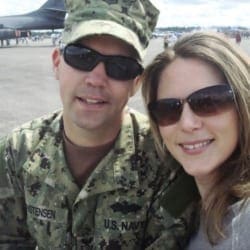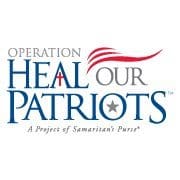Being a military caregiver means making sacrifices and taking care of those who made sacrifices for us.
What are you most excited to do as a Dole Caregiver Fellow?
I am most excited to partner with an organization that has developed a program with the best interests of the caregivers in mind. I am excited to be a part of a growing network of Fellows who help improve the lives of our military hero’s and those that take care of them.
At what moment did you realize you were a military caregiver?
As silly as it sounds, it was when someone told me. For our loved ones, we will do anything and go above and beyond no matter what. It was only when a person in a military connected organization sat me down and pointed it out, did I realize the additional role I was playing in our marriage.
How has your life changed since you became a caregiver? What sacrifices have you had to make?
As a full-time caregiver, I manage every aspect of my veteran’s day to day life: meals, medication, financial and medical affairs, among many other things, including safety. For these reasons, I stopped working outside the home.

My Story
Kristin Christensen met her husband Michael in 2012 through mutual friends. Michael, a Navy Seabee, planned to serve in the Navy his entire career. But when he submitted his packet for promotion, the review board looked at his 2007 deployment to Iraq, when he was hit by Improvised Explosive Devices (IEDs) twice in 10 days, and another occasion when he was violently struck on his head as he was ejected from his gun turret. The injuries resulted in internal damage to his arms and ribs, traumatic brain injury (TBI), post-traumatic stress disorder (PTSD), sleep disorders, and neck and back injuries that have progressed over the years. He was asked to medically retire, which made his emotional struggles even harder.
Shortly after marrying in 2013, while Michael was going through the medical retirement process, Kristin was pulled aside by his advocate who told her that she should sign up for the VA Caregiver Program. The suggestion helped Kristin realize her role would go far beyond helping Michael through his transition of leaving the Navy. Kristin now provides constant emotional and physical support to Michael, administering his medication, scheduling his appointments, reminding him of basic tasks, such as eating, and managing his mood. She also takes on the majority of childcare and helps her three children understand Michael’s needs.
On top of her daily duties, Kristin is still fighting a $60,000 bill due to a mix up during Michael’s benefits processing between the Department of the Defense and Department of Veterans Affairs, which almost resulted in losing their house. After years of phone calls, meetings with state leaders and congressional assistance, Kristin partially resolved the issue. However, this battle has highlighted the problem of service members with undiagnosed brain injuries completing paperwork on their own, and she hopes to help prevent other families from facing similar issues.
In 2021, Kristin is a full-time student at the University of Washington where she is finishing her Integrated Social Science Degree in preparation for law school in order to help other veterans through their transition from active duty.









